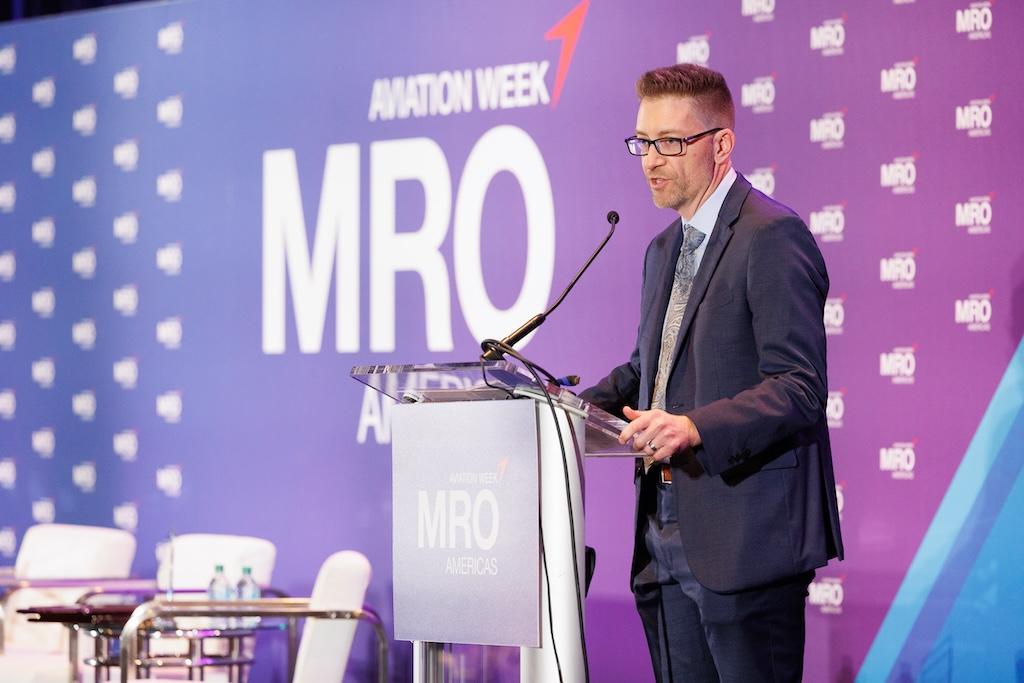Viewpoint: Airlines' Plan For Reducing Human Factors Errors In MRO

Robert Cooney, Delta Air Lines' director of fleet engineering.
Robert Cooney, Delta Air Lines’ director of fleet engineering, delivered these opening remarks April 8 to airlines and the aftermarket industry at Aviation Week Network’s MRO Americas. He is a member of Airlines for Americas’ (A4A) EMMC Council and MRO Americas conference chair.
On behalf of Airlines for America welcome to Atlanta and the 29th Annual MRO Americas. I have the distinct privilege today of representing A4A's Engineering, Maintenance and Materiel Council (or EMMC), which includes TechOps leaders from 11 member airlines.
Our mission at EMMC is to shape the future of tech ops. Shaping the future means we are in the pursuit of influencing the industry to improve aircraft safety, reliability and operational efficiency every day. To that end, I want to share two of our priorities today where I think your experience and expertise could be an accelerant in our ability to achieve them.
Integrated Aircraft Health Management
When we were last together in Chicago, I shared that we were actively pursuing opportunities to better utilize the data coming off aircraft by developing a roadmap for Integrated Aircraft Health Management (IAHM). IAHM is the use of aircraft-generated data to determine its condition [health] and manage the scheduling of maintenance.
A4A members are anticipating the growth of optional IAHM usage for both systems and powerplant functions. These tools demonstrate meaningful benefits of increased safety, reliability, sustainment and efficiency.
While these systems are largely used today for reactive actions like troubleshooting, we recognize the opportunity to apply IAHM to satisfy classic Instructions for Continued Airworthiness (ICA).
To support this vision, A4A is actively forming strategies around what aircraft and ICAs are the best fit for our programs while understanding the FAA guidance associated with OpSpec D302 approval.
We know that strong partnerships with the Design Approval Holders, suppliers and you are highly critical to identifying, prioritizing and developing our implementation plans.
Human Factors
Second, over the past three years, EMMC has taken on initiatives aimed at addressing the juniority challenges we have encountered post pandemic. Our maintenance training network has focused on investing in aspiring technicians in three areas:
- Recommending changes to the Mechanic Airman Certification Standard, which drives the curriculum at 202 U.S. AMT [aviation maintenance technician] schools.
- Partnering with OEMs to provide maintenance manual access to schools, which exposes students to modern manual systems.
- Highlighting opportunities for airline retirees to teach and volunteer at AMT schools.
We stood up the ATA Spec 127 working group to improve the authoring and presentation of work instructions, which has resulted in several recommendations including suggested practices for the use of animations, simulations and videos, and a more thoughtful use of warnings, cautions and notes.
In addition, last year we tasked our Maintenance Safety Committee to collect and analyze data concerning tech ops-induced aircraft damage and provide mitigation recommendations.
When you step back and take these initiatives in their totality, you see a common theme.
Whether it's ensuring AMTs are better prepared upon certification, putting better work instructions in the hands of our technicians or taking industry level action against the biggest aircraft damage drivers, they are all intended to reduce human factors events.
Rather than continuing to approach these initiatives as disparate activities, we are embarking on a journey to develop a strategic roadmap for reducing human factor events.
We know in the end this is an ambitious vision that will require industry alignment around leadership, improved data collection and analysis, and better tools in the hands of our technicians.
Again, this will require all of us together bringing new solutions to the table.
As you engage with the MRO Americas event this week, I encourage you to look for opportunities to support these two initiatives.
Only by working together will we be able to develop solutions that will truly shape the future of tech op.




